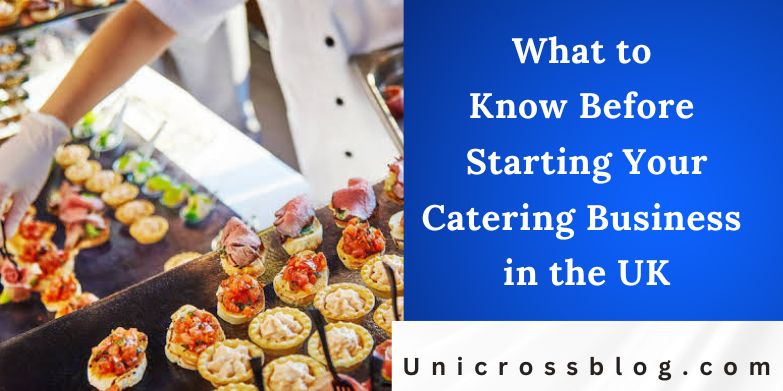Starting a catering business in the UK is an exciting venture for those passionate about food, hospitality, and creating memorable experiences. With the catering industry valued at over £1.4 billion and growing, opportunities abound for entrepreneurs to serve events ranging from weddings to corporate functions. However, launching a successful catering business requires careful planning, compliance with regulations, and a clear strategy to stand out in a competitive market.

Key Considerations for Starting a Catering Business
1. Researching the Market
Before diving in, thorough market research is essential. Understand local demand by identifying gaps in the market and assessing competitors. Analyze what types of cuisine or services are popular in your area, such as vegan catering or corporate buffets. Engage with potential customers through surveys or conversations to gauge their preferences and willingness to pay. This data will help shape your menu and pricing. Research competitors’ offerings, pricing, and target audiences to find ways to differentiate your business, such as specializing in a niche like sustainable catering or themed events.
2. Choosing a Niche
Selecting a specific niche helps you stand out in a crowded market. Decide whether to focus on private events (e.g., weddings, birthdays) or corporate functions (e.g., office lunches, conferences). Consider your culinary strengths and local demand when choosing a cuisine, such as British classics, international fusion, or dietary-specific options like gluten-free or vegan. Your niche will influence your branding, menu, and marketing approach, making it easier to attract your ideal customers.
3. Developing a Business Plan
A comprehensive business plan is the backbone of your catering venture. It should include:
-
Executive Summary: Outline your business vision, unique selling points, and financial goals.
-
Market Analysis: Detail your target market, competitors, and local demand.
-
Operations: Describe how you’ll source ingredients, prepare food, and manage events.
-
Financial Projections: Estimate startup costs (e.g., equipment, licenses, marketing) and revenue forecasts. A strong business plan not only guides your operations but also attracts investors or lenders. Typical startup costs range from £5,000 to £20,000, depending on whether you operate from home, a mobile unit, or a commercial kitchen.
4. Legal Compliance and Licenses
Operating a catering business in the UK requires adherence to strict regulations. Key steps include:
-
Food Business Registration: Register with your local authority at least 28 days before trading. This is free and mandatory for any food-related business.
-
Food Safety Qualifications: You and your staff need Level 2 Food Safety and Hygiene for Catering certifications, available through organizations like the Nationwide Caterers Association (NCASS).
-
Health and Safety Inspections: Your kitchen must meet hygiene standards, assessed by local environmental health officers. Ensure surfaces are cleanable, and storage complies with regulations.
-
Additional Licenses: If serving alcohol, obtain a liquor license. For mobile catering, secure a street trading license from your local council.
-
Record-Keeping: Maintain detailed records of suppliers, including names, addresses, delivery dates, and contents, to comply with food safety laws. Failure to meet these requirements can result in fines or closure, so consult with local authorities early.
5. Setting Up Your Kitchen
Your kitchen setup depends on your business model:
-
Home-Based: Ideal for low-cost startups, but your kitchen must meet commercial hygiene standards, which may require upgrades like enhanced ventilation or additional sinks.
-
Mobile Catering: A van or trailer allows flexibility to serve at events like festivals or weddings. Ensure the vehicle is equipped for food prep and storage.
-
Commercial Kitchen: Renting or purchasing a dedicated space offers more capacity but increases costs. Essential equipment includes ovens, refrigerators, prep tables, and serving tools. Budget carefully, prioritizing quality over cheap alternatives to avoid costly replacements.
6. Branding and Marketing
A strong brand identity sets you apart. Create a memorable logo, consistent color scheme, and professional website showcasing your menu and testimonials. Use social media platforms like Instagram and Facebook to share high-quality photos of your dishes and engage with potential clients. Network with event planners, venues, and local businesses to build referrals. Offer menu-tasting sessions to attract clients and encourage positive reviews on platforms like Google Reviews. Consider listing your business on local directories to boost visibility.
7. Staffing and Operations
For small operations, you may start solo, but larger events require a team of chefs, servers, and drivers. Hire staff with food safety training and strong customer service skills. Implement systems to manage inventory, schedules, and client preferences, using tools like Google Calendar or Trello for efficiency. Maintain consistent quality in food preparation and presentation to build a loyal customer base.
8. Financing Your Business
Estimate startup costs, including equipment (£2,000–£10,000), licenses (£300–£1,000), marketing (£500–£2,000), and ingredients (£1,000–£3,000). Explore funding options like personal savings, bank loans, or small business grants from government bodies. Open a business bank account to separate personal and business finances, simplifying budgeting and tax reporting.
READ ALSO: Australia Sponsorship Jobs for Nigerians Without IELTS
FAQs
Do I need formal culinary qualifications to start a catering business?
Formal qualifications aren’t mandatory, but culinary training or experience strengthens your credibility. A Level 2 Food Safety and Hygiene certification is legally required for you and your staff.
Can I run a catering business from home?
Yes, provided your kitchen meets health and safety standards. Contact your local environmental health officers for an inspection to ensure compliance.
How long does it take to get a food business registration?
Registration is free and typically processed within 28 days. Apply early to avoid delays.
What are the biggest challenges in catering?
Common challenges include maintaining food safety, managing multiple events, and competing in a crowded market. Mitigate these by adhering to regulations, using scheduling tools, and offering unique services.
How do I price my catering services?
Calculate costs (ingredients, labor, overheads) and research competitors’ pricing. Ensure your prices cover expenses while remaining competitive, adjusting for event size and complexity.







